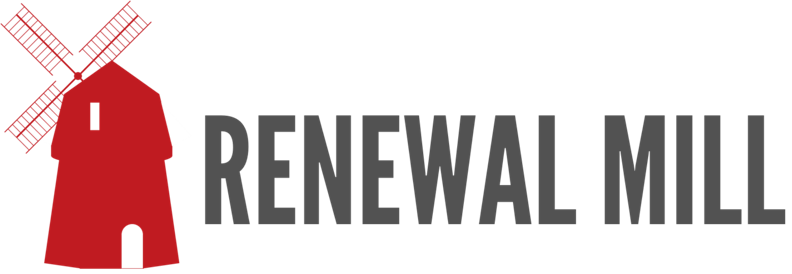Last week’s article was on organic waste bans. Organic waste bans are going into place because food waste is a huge driver of climate change. Additionally, consumers are now paying attention to the brands they’re buying from. Just check out our podcast episode with Elliot Roth & Sue Marshall where we discussed alternative ingredients and upcycling.
This week, we talked with Caroline Cotto, Co-Founder and COO of Renewal Mill, to discuss how Renewal Mill is looking to the future of food upcycling and organic waste bans. Renewal Mill was founded in 2016, and today is an award-winning venture-backed startup leading the growth of the upcycled food industry recognized by Fast Company as a World Changing Idea.
Renewal Mill is a next generation ingredients company focused on creating a new circular economy of food that reduces waste by upcycling the fibrous byproducts of food manufacturing into delicious, high quality ingredients. Food waste is the world’s $1.2 trillion problem, and our processes can be applied to an array of byproducts.
Can you describe what your company does?
Renewal Mill is fighting climate change and global food loss by upcycling the byproducts of manufacturing into premium ingredients and finished products. Our main ingredients are the soybean pulp leftover from soy milk and oat pulp leftover from oat milk. We turn these byproducts into a high fiber, high protein, gluten free flour.
What is your value proposition to your customers?
Renewal Mill’s value proposition is to turn waste into revenue. Our target customers are food manufacturers that create byproducts that would normally go to farmers for animal feedstock or the landfill.
Our first partner is a tofu company in California that is dealing with organic waste bans going into effect, who have also had inconsistency with selling to farmers. As the price of premium feed goes down, sometimes farmers don’t pick up the soybean pulp that they had been using for animal feed. In this case, the company is forced to pay to have it taken to a landfill. Some other partners don’t have any farmers in their vicinity, and as a result are forced to pay to have it taken to a landfill.
Okra can build up as a waste byproduct in a facility and take up to a quarter of a factory floor footprint before disposal. Facilities need to have a consistent solution, and that’s something that we’re offering. By partnering with us, this is a much more sustainable option and opportunity to have consistency.
Renewal Mill is trying to solve this problem for food manufacturers while keeping this valuable nutrition going to its best and highest use, which is feeding people.
What is the current ecosystem/market landscape? How does the ecosystem benefit from your technology?
Upcycling has been growing as a trend over the last two years. There are some other folks doing upcycling of byproducts, but none of them are upcycling okara. Some companies are upcycling spent grain from beer brewing, seed cakes from oil processing, things like that – a lot of produce upcycling is happening.
Even though there are others contributing in this market space, food waste is still a huge issue. We work very closely with these other brands. We’re trying to build out the market for upcycled food and formed the Upscaled Food Association, which has now grown to 70+ members. This association is working on a product certification program so that you can have your product certified the way that it would be certified organic or certified non-GMO. The association released a formal definition of upcycled food back in April of this year. As of right now, a standards committee has been formed to create the standard that brands will be judged against in order to get their products certified.
What are the current trends in the sector?
We’re seeing a lot of demand from buyers who want upcycled products, as well as demand retailers, like Whole Foods and Target, that want labels designating upcycled products. We’re also seeing a lot of e-commerce platforms starting to include “upcycled” as a filter. Outside of the food industry, upcycled products are also present in retail, makeup, plastics, and packaging.
What does the future look like?
We’re trying to help other companies who are under prepared or ill-equipped to deal with their byproducts. Some organizations are setting their own goals, such as zero waste to landfill initiatives in preparation for California’s organic waste bans going into effect. Renewal Mill aims to help and be part of this solution.
Our Outlook
Renewal Mill is a prime example of innovation in the space – upcycling food waste into valuable ingredients. Innovations that address waste management and the circular economy will do well in the upcoming years, especially with upcoming policy. As such, we are more likely to see startups emerge in the space that create value out of different byproducts, rather than competing for the same byproducts.
About The Author

Daniel currently works at Lawrence Livermore National Laboratory. His original assignment was to maintain and update facility safety documentation for all facilities on-site, and perform risk analysis. Over time, his role has expanded to leading continuous improvement efforts through product management.
Concurrently, Daniel volunteers with Techstars, helping organize startup weekends, and with the American Institute of Chemical Engineers, organizing events on the local and national levels of the organization. He also volunteers with One World, and previously with Powerhouse Ventures, to source and screen startups for potential investment.
Daniel holds a BS in Chemical Engineering from UC Davis, and recently completed coursework in energy innovation from Stanford. His passion is at the intersection of sustainability, innovation, and business.

